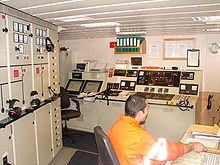| Revision as of 04:40, 6 July 2012 editN2e (talk | contribs)Extended confirmed users, Pending changes reviewers55,606 edits cn← Previous edit | Revision as of 09:00, 6 July 2012 edit undoAnomieBOT (talk | contribs)Bots6,557,146 editsm Dating maintenance tags: {{Whom}} {{Cn}}Next edit → | ||
| Line 12: | Line 12: | ||
| * ] | * ] | ||
| The Engine Department emerged with the arrival of marine engines for propulsion, largely during the latter half of the 19th century. Due to advancement in Marine Technology during the twentieth century, the engineering department is considered{{whom}} as equally important as the ].{{cn}} | The Engine Department emerged with the arrival of marine engines for propulsion, largely during the latter half of the 19th century. Due to advancement in Marine Technology during the twentieth century, the engineering department is considered{{whom|date=July 2012}} as equally important as the ].{{cn|date=July 2012}} | ||
| Nowadays due to the increase in ] on Merchant Vessels and increase in the ] (UMS) class vessels the number of Marine Engineers have decreased drastically on board a Merchant Ship. Today the Engine department usually consists of the following number of Engineers and crew:{{cn}} | Nowadays due to the increase in ] on Merchant Vessels and increase in the ] (UMS) class vessels the number of Marine Engineers have decreased drastically on board a Merchant Ship. Today the Engine department usually consists of the following number of Engineers and crew:{{cn|date=July 2012}} | ||
| * (1) ] | * (1) ] | ||
Revision as of 09:00, 6 July 2012
| This article includes a list of general references, but it lacks sufficient corresponding inline citations. Please help to improve this article by introducing more precise citations. (July 2012) (Learn how and when to remove this message) |

In maritime transportation, the engine department or engineering department is an organizational unit aboard a ship that is responsible for the operating, maintaining and repairing the propulsion systems and the support systems for crew, passengers and cargo. It is also responsible for other systems such as:
- Electrical Power Generation Plant
- Lighting
- Fuel Oil
- Lubrication
- Water distillation
- separation
- Air conditioning
- Refrigeration
The Engine Department emerged with the arrival of marine engines for propulsion, largely during the latter half of the 19th century. Due to advancement in Marine Technology during the twentieth century, the engineering department is considered as equally important as the Deck Department.
Nowadays due to the increase in Automation on Merchant Vessels and increase in the Unattended Machinery Spaces (UMS) class vessels the number of Marine Engineers have decreased drastically on board a Merchant Ship. Today the Engine department usually consists of the following number of Engineers and crew:
- (1) Chief Engineer
- (1) Second Engineer
- (1) Third Engineer
- (1-2) Forth Engineer
- (2-4) Junior Engineer
- (0-1) Engine Cadet
- (0-2) Oiler
- (0-1) Wiper
- (0-1) Fitter
- (0-1) Motorman
- (0-1) Machinist
See also
- Marine Engineer
- Engine room
- List of maritime colleges
- Marine fuel management
- Seafarer's professions and ranks
- Society of Naval Architects and Marine Engineers
- Institute of Marine Engineers, Scientists and Techonologists
References
| This article includes a list of general references, but it lacks sufficient corresponding inline citations. Please help to improve this article by introducing more precise citations. (November 2008) (Learn how and when to remove this message) |